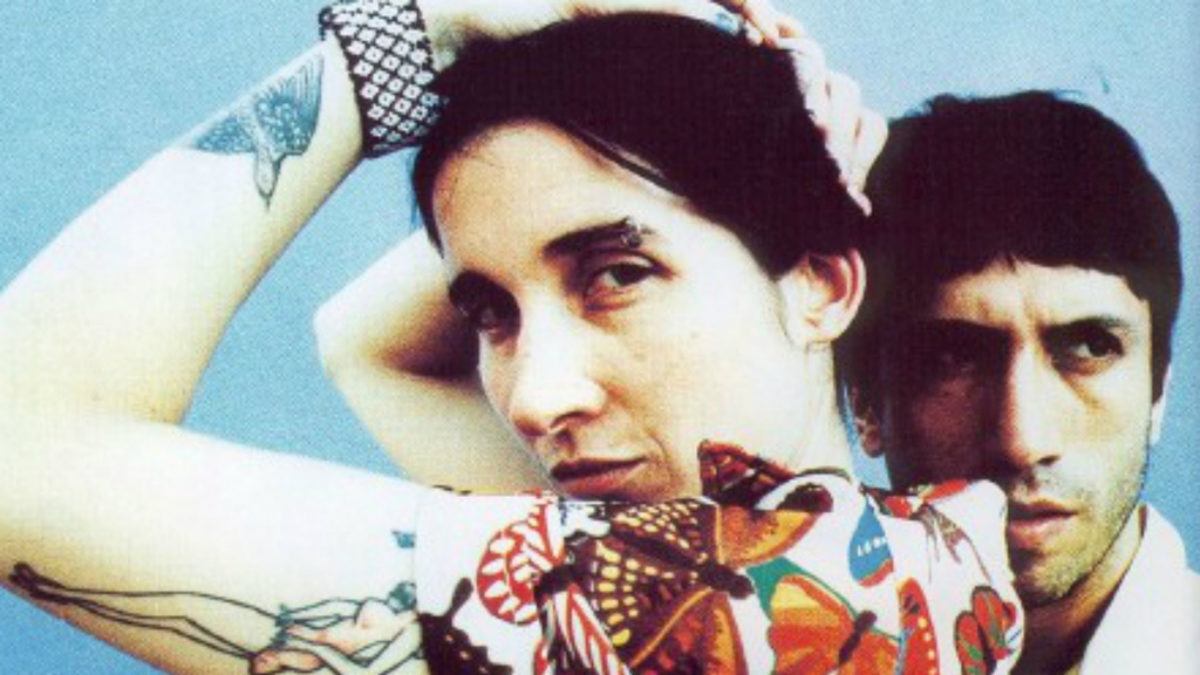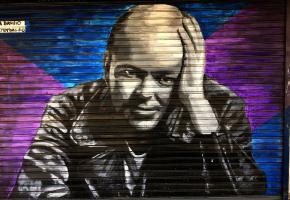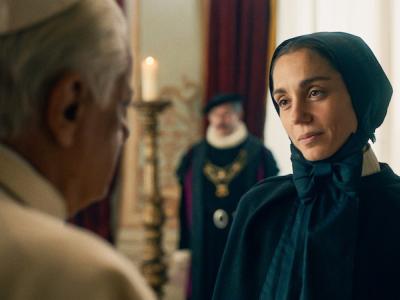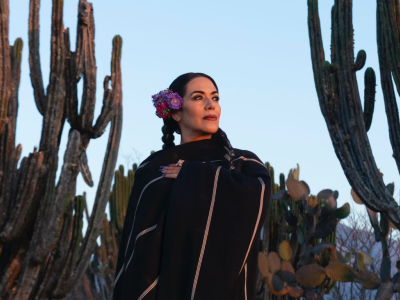Back in 1990, Andrea Echeverri and Hector Buitrago formed a rock band that was to define a generation of Colombians. Los Aterciopelados defied Colombia's conservative history and screamed rebellion and social change.
"We took the name from a book by Simon de Beauvoir called La Mujer Rota, and the quote goes Aterciopelada flor de la passion,” remembers Andrea. “It represented what we were…an eclectic mix; one moment livid and danceable, the next deeply emotional...we can be velvety or thorny."
This year, 11 albums and 3 Latin Grammys later, almost thirty years after the release of El Dorado, Los Aterciopelados returned to Bogota’s El Palacio de los Deportes, to initiate an anniversary world tour of that second studio album, which catapulted them to international fame back.
"It was a magical evening. Seeing from 30 to 40-year-olds to young kids singing out loud. seeing generations that were not even born when El Dorado came out, listening and knowing their songs by heart It is amazing to see this generational bridge as these kids learn our songs from their parents, and El Dorado is still alive and present in people’s lives," Andrea explains, excitedly.
After their first album, Corazon de la Mano, became a local hit in 1993, blasting all across Colombia's radios, they joined a new generation of emerging young rock bands who energy was felt throughout Latin America. "Thanks to the success of Corazon de la Mano, BMG, gave us the best studio in Bogota, Audio Vision, to record our second album around 1994." Hector explains over Zoom, as he stands in a field in the middle of Colombia, where he is currently undertaking one of his many humanitarian projects.
Transitioning away from the punk sound on Corazon de la Mano to a more pop/rock sound with the help of producer Federico Lopez, he says "Like that, El Dorado was born, and the videos we produced started streaming on MTV Latino, which was extremely popular all over the continent."
Once El Dorado hit the market, it changed the lives of Andrea and Hector forever; they both gained international fame with El Bolero Falaz and Florecita Rockera. El Dorado sold more than 200 thousand copies around the world and became known as one of the most influential and important records in Spanish rock. In 1996, they started touring with Soda Stereo.
So why an anniversary tour? I ask
"People ask why 27 years? It is a rare number," Andrea explains. "Well, we wanted to celebrate the 25th, but the pandemic hit. It is such a beautiful feeling getting back on stage and reconnecting with these songs, even though we still play them like the classic hits."
Bringing back the energy of concerts from 27 years ago was a challenge, as Andrea describes the rehearsals. "I used to jump up and down from the stage, and well, this time we had to adapt. Now doing it is quite challenging, but I am so happy with the show we have created for this tour."
Besides, many of the topics they addressed in songs Pilas and Colombia Conexión 30 years ago such as social injustice, climate change, and violence, are still relevant.
“El Dorado reflects the society it was made in and unfortunately, in some ways, little has changed. Issues like machismo and social injustice are still there. One would say, Oh, after 27 years, that is gone. But it hasn't. We need to keep talking about it. We can’t live as if everything was fine." Andrea reflects.
Hector continues. "We started playing Siervo son Tierra again after many years, and it was very emotional and exciting. The lyrics reflect a lot of what is happening in Colombia, and in many other Latin American countries. It talks about the problems of the land; people can’t find places to live and to grow food." Change was promised by the new government, Andrea says, however, those promises haven’t really stuck. "Change is slow for issues that are so deep and old that permeate our country. With the violence, inequality, and corruption that exist in Colombia, it will be hard."
Back in 1995, Colombia’s 40 year-long civil war was raging. "At least now there are no bombs," Andrea explains. "But there is still lots of violence, especially in the rural zones. The government is beginning to be more inclusive of the indigenous community. There is hope and a possible positive change." Since El Dorado's triumph, Andrea and Hector have dedicated their success to maintaining an ongoing conversation about social problems and the environment in Colombia and beyond.
Hector hopes that new generations and new governments with fresh perspectives will bring light at the end of the tunnel. “But it is time for a change for all humanity. We have a lot at stake that affects our country. I hope as humans we can achieve that change and finish with corruption once and for all." For his own part, Hector runs a project called Canto de Agua “where we are trying to find solutions to protect the water beyond relying on the government or NGOs."
At the same time, the couple are still undeniably icons of a certain Latin American pop era, who many artists admire. Mexican music icon Thalia recently released a version of Florecita Rockera, one of the band’s most famous hits, on which she asked them to collaborate. “We never expected to collaborate with Thalia!” She considered this song one of the most influential songs in Spanish rock.”
In 2021, the couple launched a new album Tropiplop, a modern take on an age-old Latin American protest movement, a nod to the Chilean greats Violeta Parra and Victor Jara, filled with synths, traditional drums and gaitas and electronic sounds. Singles Ovarios, No se Viola and Plañidera address misogyny and femicide, while the album’s title track Tropiplop attacks the “dystopic politics, generic government looting its neighbours, a tropical utopia, polemic thieves.”
Their concert this year in London was their first in 20 years, but the duo is continuously experimenting and creating new music. "We are still evolving, looking into the future,” Says Hector. “ Similar to El Dorado, we are faithful to our ideals.”
















